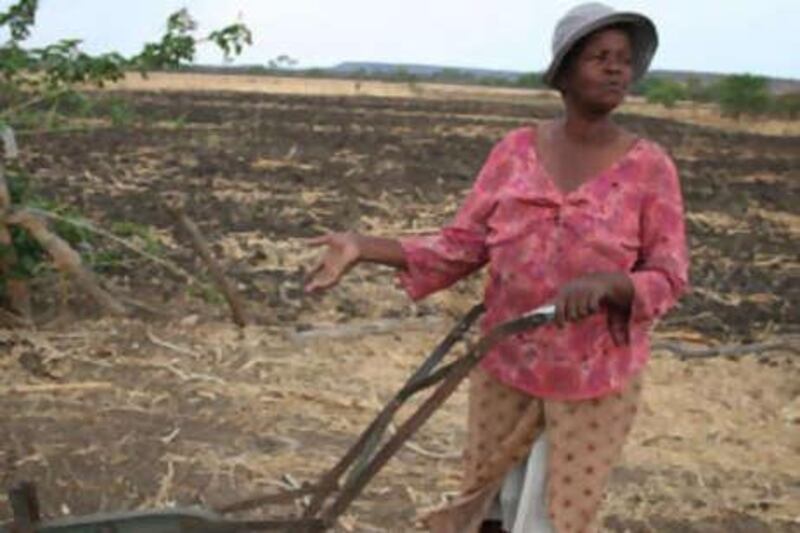BULAWAYO, ZIMBABWE // Under normal circumstances Ntombizodwa Moyo, 61, a peasant farmer, should be ready to plant at the onset of summer rains, traditionally about the end of this month. But as has been the case in recent years, she is still waiting for maize seed and fertiliser, key resources for a smallholding farmer such as herself. And the rains are just days away. "I have tilled my field already, but cannot do anything without seed," she said at her 4.5-hectare plot at Spring Farm, 40km west of Bulawayo. "It is not there in the shops, so I am waiting for government support like everyone else in the village. "My biggest problem is lack of corn seed because in this area the soils are quite fertile, so we can do without fertiliser. I hope we will get it, otherwise we could end up begging for food again next year." Rains have already started falling in the north of the country, marking the beginning of the farming season, which runs October to March. Since 2000, when Robert Mugabe launched his campaign of seizing white-owned farmland to redistribute to landless blacks, the country has struggled with falling agricultural production, partly caused by a widespread shortage in seeds and other resources. The land seizure programme disrupted the lifeline agricultural sector, triggering a flight of investors fearful of a violation of their property rights. This, among other factors, precipitated the current economic crisis in which inflation now stands at 231 million per cent - the world's highest. There are widespread food, fuel and foreign currency shortages. Now the government of the formerly prosperous southern African country is failing to import resources for its farming sector, hence the crisis facing Mrs Moyo and millions of other farmers. Commercial farmers, whose work is more mechanised, are facing a greater struggle. Apart from having to contend with the unavailability of seed and fertiliser, they cannot secure fuel to power the tractors they use for tilling their land. They also complain about constant electricity supply cuts, which disrupt their irrigation cycles. A salesman at Farm and City Centre, one of the country's largest companies stocking farm resources, said they have not received any supplies since January. "We have nothing, no corn seed or fertiliser. We are still waiting for deliveries. We do not know when they will arrive," said the salesman, based in Bulawayo. Zimbabwe consumes at least 1.8 million tonnes of corn every year. However, because of the economic crisis and frequent droughts, farmers have in recent years harvested less than half the national requirement, resulting in widespread hunger. The United Nations estimates 3.8 million people are hungry across the country. It is concerned the figure could rise to more than 5m in the first three months of 2009. In a bid to boost production, the government has embarked on an ambitious targeted farming scheme, under which authorities select certain farmers to plant maize on a cumulative 500,000 hectares. Wilson Nyabonda, president of the Zimbabwe Commercial Farmers' Union, acknowledged there was no fertiliser or seed for corn available on the market. He said farmers were about 25 per cent prepared for planting compared with about 80 per cent or 90 per cent as was usual by this time. "The government has started moving resources from Harare to outlying areas to farmers operating under the targeted farming scheme," Mr Nyabonda said. "But considering the time left before the recommended planting period and the high demand for the resources, logistically we might be unable to distribute them on time. Remember, we are talking about moving resources to a few selected farmers operating under the government-supported programme. Those who were not chosen have to buy seed and fertiliser from somewhere, but go to any shop, there is nothing." Out of 50,000 tonnes of corn seed required every year, 30,000 tonnes have been secured, said Rugare Gumbo, the agriculture minister. Renson Gasela, an agricultural expert and former shadow agriculture minister, recently told IRIN, a UN news service, that the delivery of more resources to more farmers must be done speedily. "There are no inputs on the ground," Mr Gasela said. "And what we are hearing from the press is that a lot is being done to assist targeted farmers and those targeted are said to be top farmers, but the number of top farmers is small compared to over one million small-scale farmers around the country." The Southern African Development Community, of which Zimbabwe is a member, has recognised the inability of the Zimbabwe government to mobilise farm resources and has announced a regional assistance plan. Last week, South Africa also promised a lifeline of 300 million rand (Dh110.4m) to help the struggling farm sector. However, both assistance packages are predicated on the success of power-sharing negotiations between Mr Mugabe and the opposition. * The National
Zimbabwe's farmers face barren times
Since Robert Mugabe began his campaign of seizing white-owned farmland, there has been a struggle with agriculture.

Editor's picks
More from the national




